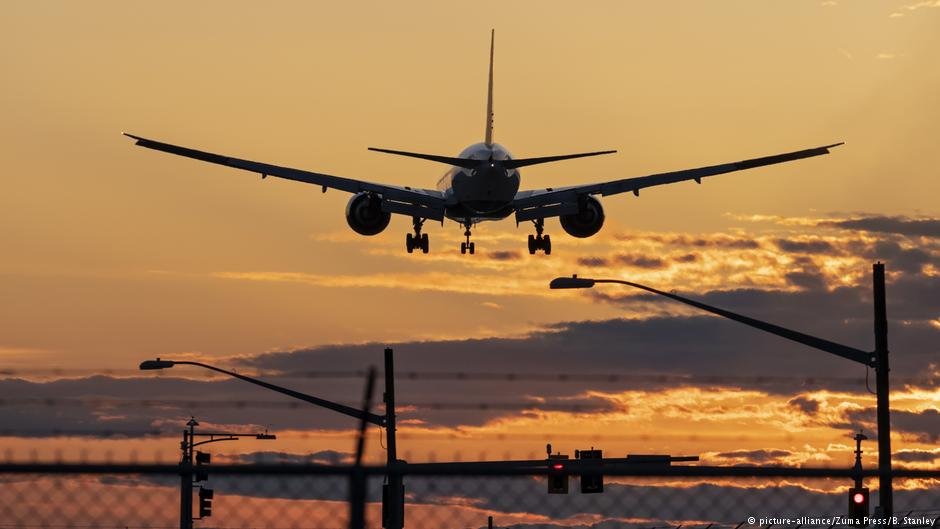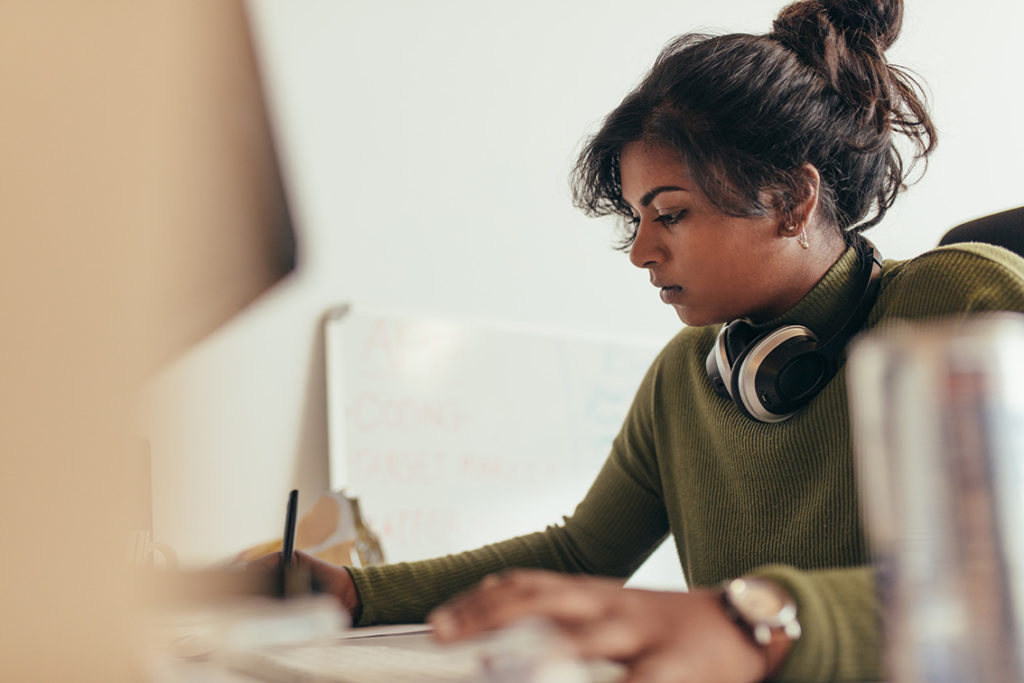Young Refugees fighting Covid-19

Refugees and their host communities are amongst the most vulnerable to the COVID-19 pandemic. A group of young refugees from different countries wanted to overcome the feeling of hopelessness. They started a campaign putting a spotlight on young refugees fighting actively against the pandemic. Many of these local heroes are current students and graduates of UNHCR’s higher education scholarship programme called DAFI. We took a closer look at the situation in Kenya.
South Sudanese youngster Adhieu counts herself amongst the lucky ones. This is particularly astonishing, as she had to flee her home country due to an ongoing civil war, and as she suffered the terrifying experiences of discrimination and stigmatisation that millions of refugees face. When Adhieu was forced to flee a couple of years ago, she ended up stuck in a refugee camp in South Sudan’s neighbouring country Kenya. What made her lucky after all, she says, was the fact that she got to know about DAFI [https://rumoursaboutgermany.info/facts/dafi-programme/]. With financial support mainly coming from Germany’s Federal Foreign Office, the UN Refugee Agency’s scholarship programme offers young students with refugee backgrounds the opportunity to study at universities and colleges in their country of asylum. Adhieu got accepted with the DAFI programme and was able to fulfil her dream: she studies Commerce at Jomo Kenyatta University of Agriculture and Technology on the outskirts of Nairobi and is set to graduate in 2022. Before the outbreak of the COVID-19 pandemic, she offered training for women in entrepreneurial skills and was engaged in mentorships for young girls in the educational field.

Self-made face masks, soap and ventilators
With her local community severely hit by the global health crisis, Adhieu was quick to respond. She felt the duty to do her bit — that was how she described her motivation. Within days, the DAFI student produced more than 3000 face masks that were distributed in her refugee camp. “If there is a way you can help, you have to do it immediately, because there is never the right time to do so,” the young volunteer says. Adhieu then taught herself how to produce soap without any technical equipment and started to manufacture this essential, but in refugee camps scarce, hygiene product in large quantities. “If someone with a good heart could get us some basic machinery to produce more soap, that would not only help me but the entire community,” Adhieu adds. Not content with this, Adhieu inspired other refugee students from South Sudan to produce ventilators for potential COVID-19 patients. Based on very basic, easily acquired materials, they developed ventilator prototypes that perform essential tasks and could be sent to refugee camps, and also to her home country, South Sudan.
Putting a spotlight on local heroes fighting the health crisis
Members of UNHCR’s Global Youth Advisory Council (GYAC) as well as the student-led Tertiary Refugee Student Network (TRSN) have started to collect encouraging stories like Adhieu’s. The videos, pictures and quotes shared via social media are there to spread awareness of the positive contributions of refugee youth, but should also inspire others to take action (in a safe way and in line with health advice). The short online videos feature young refugees supporting health care workers, volunteering to inform and train others, or assisting the vulnerable and those at risk. They encourage viewers to further share the video, or create their own.
https://www.unhcr.org/stories.html
Follow: @UNHCR_GYAC @StudentRefugee
https://sites.google.com/view/trsn/home
DAFI graduate and Iraqi nurse Moheyman is working tirelessly to help Iranians and fellow refugees in the current COVID-19 crisis
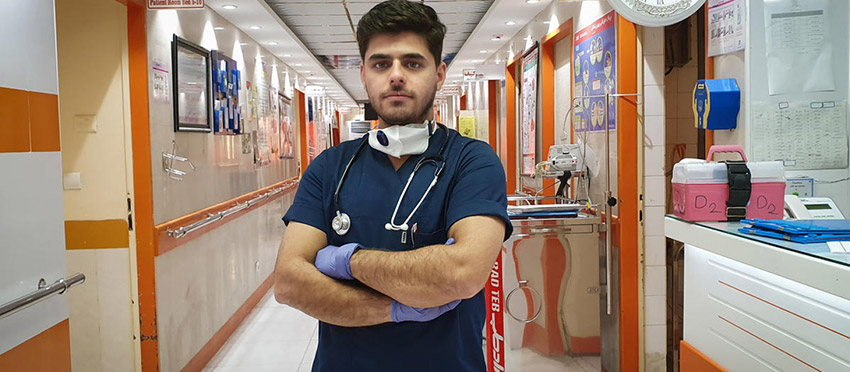
“I wanted to make a difference…”
Moheyman Alkhatavi, 24, is an Iraqi refugee who works as a nurse in the in-patient ward of Taleghani Hospital in Abadan, a city in Khuzestan, the Islamic Republic of Iran’s most south-westerly province. Moheyman is part of a team of dedicated nurses working tirelessly on rotation to monitor some 50 new patients admitted to the hospital’s quarantine unit each week while they await their test results. He constantly checks his patients’ breathing and other symptoms, trying his best to secure the medicines they need to manage their pain. Moheyman was born in Ahwaz, Iran, after his father fled the city of Ammareh in the south-eastern Maysan Province of Iraq some forty years ago, due to insecurity. After finishing high school, he was able to pursue a university degree in nursing through UNHCR’s DAFI scholarship scheme, mainly funded by the German government. “I remember people telling me that, because I was a refugee, I shouldn’t dream to go to university and instead focus on learning an easier trade,” he says. “But I wanted to make a difference in people’s lives.”
https://www.unhcr.org/ph/18521-covid19-refugeenurse.html
DAFI graduate and Rwandan nurse Bahati is working night shifts in a hospital in Nairobi during her medical internship to support the Kenyan COVID-19 response
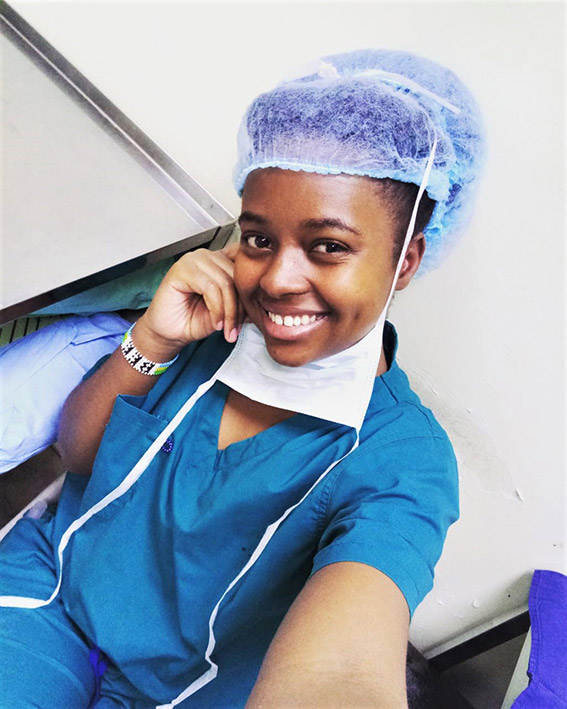
“I chose nursing because I want to be ready and helpful in times of need.”
Bahati Ernestine Hategekimana, 25, is studying nursing thanks to the DAFI scholarship she won in 2014. Born in Rwanda, she fled with her family to Kenya in 1996, where she completed her primary and secondary education. When she is not studying, Bahati volunteers with International Physicians for the Prevention of Nuclear War and the Beyond Sciences Initiative. Bahati graduated in 2019 and since 2020 she has been employed by UNHCR Kenya on the National UN Volunteers scheme. She works on youth mobilisation. During her medical internship, she is working as a nurse in a hospital in Nairobi. Bahati is an active member of the Tertiary Refugee Student Network and contributes actively to their COVID-19 youth-led Communication Campaign.
https://www.unhcr.org/ph/18491-apr2020-enews-covid19refugees.html/bahati
DAFI graduate, Congolese Doctor Jonas works in a hospital in Rwanda supporting patients suffering from COVID-19 symptoms
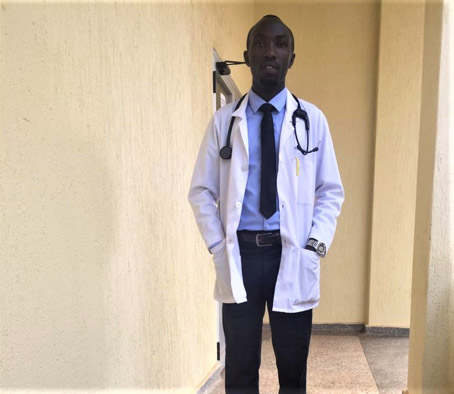
“I come from a large, non-educated family. Seeing what education can do for families and communities is my biggest drive.”
“Dr Jonas”, 29, is how he is known across Kiziba, Rwanda’s oldest existing camp, nestled on top of a mountain overlooking Lake Kivu, where 17,000 refugees have been living in limbo since 1996. The camp was originally established to help cope with the influx of tens of thousands of refugees fleeing war in the neighbouring Democratic Republic of the Congo (DRC). A DAFI student since 2012, Jonas was chosen from among 800 applicants and has proven worthy of the high expectations placed on him; he graduated in 2018 and started working as a medical doctor. He is the very first refugee graduate in medicine not only in Kiziba but in the whole of Rwanda. At present, he is working at Byumba District Hospital in Rwanda, fighting the COVID-19 pandemic as hard as he can. “We assess the potential COVID suspects, and if confirmed, prepare those patients for further treatment in special medical units,” Jonas says.

